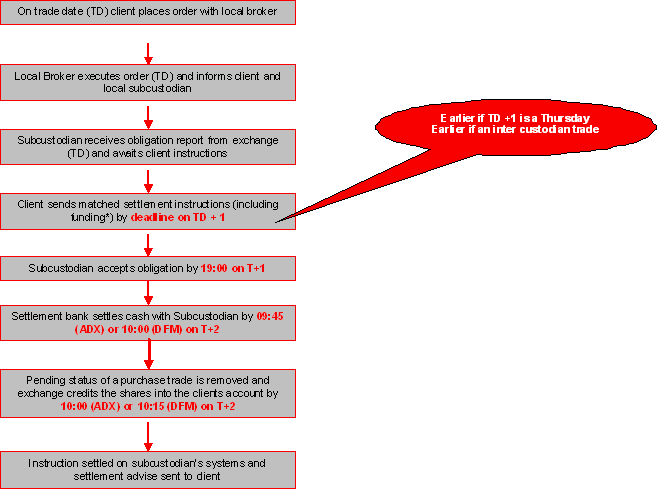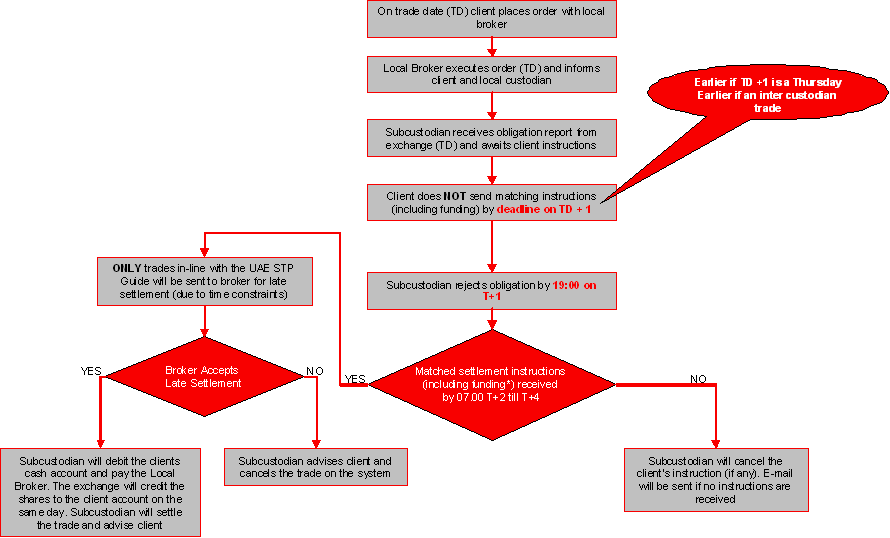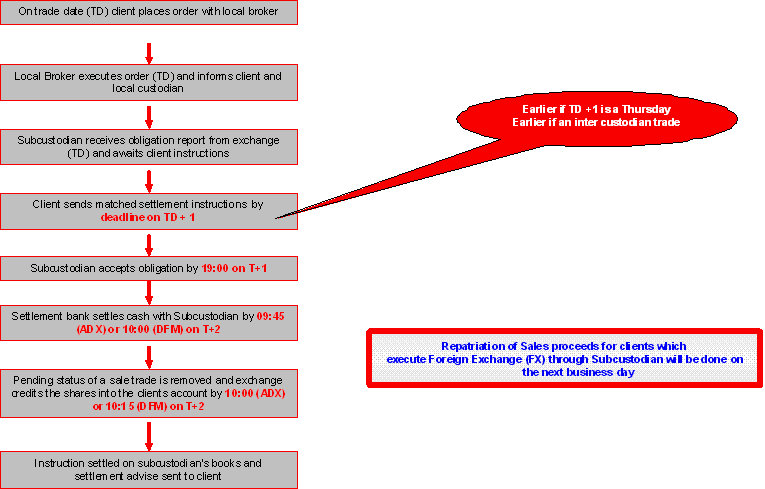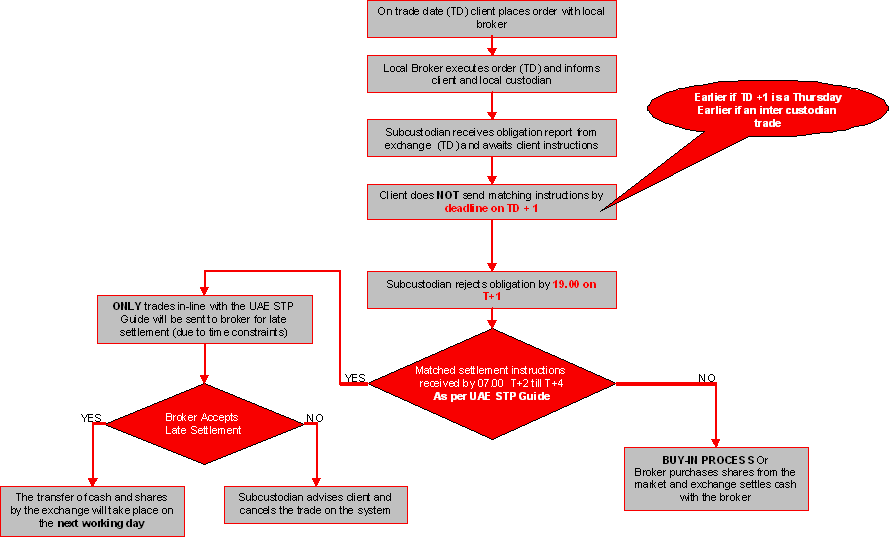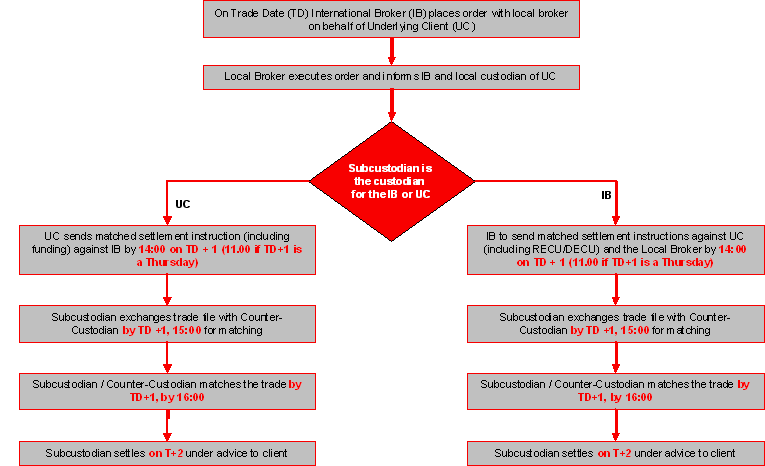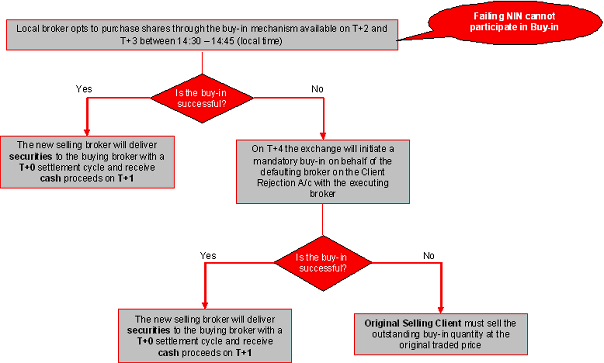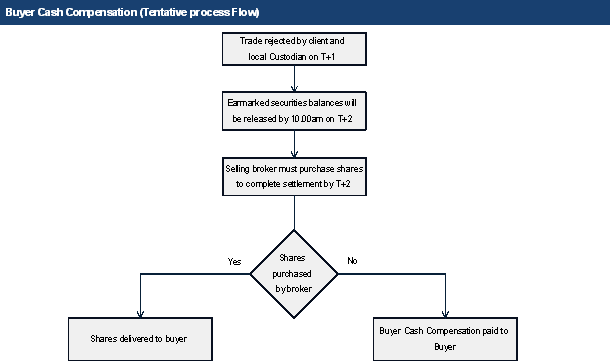Appointed subcustodians
Some markets are restricted for UCITS funds investment – please refer to your depositary team
UAE - Dubai
Updated as at January 5, 2023
Market Account Opening Requirements
FII Market Entry Requirements for United Arab Emirates RBC IS operates a segregated account structure in this market. Please refer to 'Market Account Opening Requirements' for information on the market requirements. Clients are requested to refer to the requirements for information purposes only. For further information or support around accessing this market, please contact your RBC IS representative. |
Market Statistics
| Currency | UAE dirham (AED) | ||||||||
|---|---|---|---|---|---|---|---|---|---|
| Time Zone | GMT + 4 | ||||||||
| Dubai Financial Market (DFM) |
|
Market Infrastructure
| Exchange(s) | Dubai Financial Market (DFM) - Organised share trading in the UAE started with the establishment of the DFM in March 2000, in the emirate of Dubai. The DFM was the first trading floor established, as a public financial institution with legal, administrative and financial independence. The DFM trades in equities, government and commercial bonds, Islamic sukuks and mutual funds. Please note that mutual funds are listed for visibility only and are not tradable on the exchange. |
||||||||||
|---|---|---|---|---|---|---|---|---|---|---|---|
| Trading System | DFM use the Equator and OMX X-Stream system for market operations. DFM currently operates on an automated screen-based trading system, which is an order driven system matching buying and selling orders of the investors. Investors can place their orders with DFM accredited brokers, who enter these orders into the trading system. Then, the system automatically matches buy and sell orders of a particular security based on the price and quantity requirements. |
||||||||||
| Trading Hours |
|
||||||||||
| Security Identifiers | ISIN (International Securities Identification Numbering): Yes. |
||||||||||
| Regulatory Bodies | The Securities and Commodities Authority (SCA) - established in February 2000, SCA is responsible for developing the UAE capital market. The Federal Government appoints board members, and it acts as the regulator for both stock exchanges, the DFM and the ADX. The main objective of SCA is to supervise the various participants in the market and enforce their compliance with the laws, rules and regulations, and to ensure transparency in the working of the market to create the ideal investment environment, by monitoring all trading activities and changes in the market, and analysing movements and market information. In addition, they require listed companies and brokers to submit regular reporting and maintain compliance responsibilities. |
||||||||||
| Instruments |
|
||||||||||
| Form of Securities | DFM is a scripless market where registration takes place automatically via book-entry at the CSD. All securities are registered and held at the depository in the name of the beneficial owner. |
||||||||||
| Board Lots |
|
||||||||||
| Price Variations |
|
Settlement & Registration
| Settlement Cycles |
|
||||||||
|---|---|---|---|---|---|---|---|---|---|
| Delivery versus Payment (DvP) Settlement Currencies | AED |
||||||||
| Over-the-Counter (OTC) | Not applicable to this market. |
||||||||
| Settlement Procedures | The Dubai Financial Market (DFM) implemented Delivery versus Payment (DvP) settlement mechanism from May 29, 2011.
*Please note that market charges/fees may apply to late settlement post T+2 and will be deducted from the sales proceeds by the market.
2. Direct / Turnaround purchase trade settlement - DFM / ADX obligation rejected by subcustodian
3. Direct / Turnaround sell trade settlement flow - DFM / ADX obligation accepted by subcustodian
4. Direct / Turnaraound sell trade settlement flow - DFM / ADX obligation rejected by subcustodian
5. Inter custodian turnaround trade settlement flow
Market Risks:
In case of sale trades, investors need to move securities from the depository account to the trading account prior to the execution of trades in the market. The broker can execute a sell trade by using the client NIN number, but they cannot view the trading account of the client with the subcustodian and only has access to client trading account maintained by them. However with the implementation of DVP model, the Sub-Custodians have better control & protection over client assets and especially with added feature of "Buyer Cash Compensation (BCC) - a measure provided by the markets whereby seller's assets are protected, if he irrevocably rejects a sell trade, which they do not recognise & treat it as a bad trade. |
||||||||
| Short Selling | In September 2016, the SCA transferred some of its governance role to the local exchanges thus allowing the DFM and ADX to set the required rules/procedures for certain activities including- market making, stock borrowing and lending and short selling, enabling the local exchanges to create a more vibrant market. Within SCA’s new framework, the DFM and ADX have worked on updating the rules and procedures on introducing SLB and short selling. The Dubai Financial Market (DFM) exchange recently issued rules and general procedures for Securities Lending and Borrowing (SLB). Further, the Abu Dhabi Securities Exchange (ADX) implemented Technical Short Selling (TSS) service. |
||||||||
| Turn-around Trades | Turnarounds trades are allowed in DFM and the same has to be arranged by the local broker. Since May 2014, DFM amended trading practice to enable same day execution of matching orders (buy and sell) on the same NIN and security at the same price through same/ different brokers. This new practice applies to the following types of Investors: Direct Market Access (DMA), Funds, ETF issuers, Institutional Investors and Professional Investors. |
||||||||
| Clearing Agents | DFM registered Brokers & Sub-custodians act as Clearing Agents through the DFM appointed Settlement Banks. In April 2020, DFM launched the central counterparty (CCP) company – Dubai Clear LLC (Dubai Clear) and Dubai Central Securities Depository LLC (Dubai CSD) under the umbrella of Dubai Central Clearing and Depository Holding LLC (DCCD). |
||||||||
| Depositories | The Clearing, Settlement and Depository Division (CSD) |
||||||||
| Bank for International Settlements (BIS) Settlement Model | BIS is an international organisation which fosters cooperation among central banks and other agencies in pursuit of monetary and financial stability. The Committee on Payments and Market Infrastructures (CPMI) uses three common structural approaches, or models, to categorise the links between delivery and payment in a securities settlement system. |
||||||||
| Registration Process |
|
||||||||
| Registrar | Shares are deemed registered when moved from the seller's account to the buyer's account on settlement date. All securities are dematerialised with the CSD where registration takes place automatically via book-entry at the CSD. |
||||||||
| Registration Period | The normal registration period is not applicable, as the transfer of ownership occurs simultaneously with settlement. |
Risk
| Disclosure Requirements | Shareholdings in this market may be required to be disclosed by the beneficial owner, particularly when such shareholdings reach or exceed prescribed disclosure limits. Investors must ensure that they comply in full by reporting such holdings to the appropriate organisations for this market, within the timeframe required. If you have any questions regarding this issue we encourage you to consult your legal counsel.
The official letter should be directed to the relevant department of the DFM and to the Disclosure Department of the Securities and Commodities Authority (SCA). The letter maybe delivered either as a hard copy [courier], fax, or e-mail as long as the confirmation of the receipt is done by the counterparty.
|
||||||||
|---|---|---|---|---|---|---|---|---|---|
| Buy-Ins | Buy-ins and Buyer Cash Compensation (BCC) procedures are applicable in the market with the DvP model implementation - details provided as follows: Buy-in mechanism for rejected trades
Effective from trade date September 4, 2011, trades processed within the late confirmation window will be subject to the following penalties, which will be levied on the NIN holder and collected through the local subcustodian:
Bonds: buy in fees are 0.000275% subject to a minimum of AED 65 and calculated as follows:
Order fee - AED 10 will be applied (if total trading commission is less than AED 65) |
||||||||
| Securities Lending | Within SCA’s new framework, the DFM and ADX have worked on updating the rules and procedures on introducing SLB and short selling. The Dubai Financial Market (DFM) exchange recently issued rules and general procedures for Securities Lending and Borrowing (SLB). Further, the Abu Dhabi Securities Exchange (ADX) implemented Technical Short Selling (TSS) service. |
||||||||
| Compensation Fund | Not applicable |
||||||||
| Anti-Money Laundering | The key regulations and initiatives in this respect issued by the Central Bank of the UAE include, but are not limited to: |
Foreign Ownership
| Market Entrance Requirements | This is an FII market. Please contact your RBC Investor Services' Client Manager before making portfolio investments. |
|---|---|
| Investment Restrictions | Effective June 1, 2021, new Commercial Companies Law allows full ownership by foreign investors of their onshore businesses, rather than the previous 49% limit and the requirement of an Emirati individual or Emirati company to hold the remaining 51%. The new law will not apply to companies that are wholly owned by federal, local governments, their subsidiaries, or those excluded based on a decision by the Cabinet. |
| Repatriation Policy | There are no restrictions on the remittance of investment funds into or out of the United Arab Emirates (UAE). |
Cash
| FX Regulations | There are no currency restrictions in UAE and the local currency is freely convertible against most major currencies of the world and is pegged to the USD at a rate of AED 3.6725 (as at July 2008), which has the ability to move a few points up or down depending on availability of cash at the Central Bank on a specific date. |
|---|---|
| Payment Systems | The settlement bank for the Dubai Financial Market is the Emirates National Bank of Dubai (Emirates NBD) ), Dubai Bank & Standard Chartered Bank. All brokers and subcustodians are required to maintain accounts with the settlement bank(s) to facilitate DFM settlements. All cash settlements take place between 10:00 and 12:00 on T+2 in the settlement bank book(s), where as shares would move in DFM between buyer and seller on T+2 from 08:00 to 10:00 on T+2. |
| Overdraft Permitted | As per Central Bank of UAE rules and regulations, overdrafts are not permitted on securities cash accounts. |
Entitlements
| Dividend Process | The distribution of cash dividend is handled by the CSD department of DFM based on the holdings in the CSD. The Issuer / Registrar forward the cheques to the registered holders on the pay date via ordinary mail. These cheques / bank orders can take between seven and 10 days to be received by the subcustodian. The company registrar issues cheques on pay date, however these are usually sent via ordinary post and can take between seven to ten days to be received. Dividend cheques received resulting from corporate events will be cleared and processed on same day basis, provided that the cheques are presented to the clearing bank before 10:00. The cleared funds are credited to investor's non-resident AED account. These funds can be freely remitted to an account overseas depending upon the client's instructions. Companies have the option to pay cash dividends directly into shareholders' cash accounts via wire transfers or cheques sent by registered post. |
||||||
|---|---|---|---|---|---|---|---|
| Dividend Payment Frequency | Companies do most dividend payments during March and April. There is no concept of a fixed pay date. |
||||||
| Interest Payment Frequency | Dividends on equity are generally paid annually. Interest on corporate bonds is usually paid semi-annually. |
||||||
| Interest Accrual Rate | Not applicable in UAE market |
||||||
| Corporate Actions |
|
||||||
| Additional Information | For DFM, market claims would be applicable due to late settlement window and entitlements would be paid directly by the company based on the settled positions / holdings in the CSD as of record date. The Impact of DvP on Corporate Actions is as follows:
In the case of an error trade, the client will not receive the corporate action proceeds and will have to claim the benefit from the local broker. The Local broker must replace the securities sold in error plus any relevant corporate action due to the client. |
||||||
| Protection of Rights | Entitlements are based on the settled position as at the close of trading on the record date. Currently Rights are not tradable. |
Proxy Voting
| Foreign Investor Restrictions | Entitlement of voting is ascertained from the CSD and the company's registrar. The CSD report indicates the beneficial owner and there is no Nominee concept in the market. Individual foreign investors are entitled to vote on their entire holdings. An authorised representative of the investor must not hold more than 5% of the company capital. |
|---|---|
| Shares Blocked | Trading is suspended if an AGM is in session during the trading hours of the DFM. The particular shares of the company would not be traded up until the end of the AGM. However, if the AGM is held after trading hours, the shares would be traded at the DFM as it would on normal trading days. |
| Meeting Notices/Agendas | Yes, the agendas are required to be provided in a meeting announcement. However, some of these announcements are in Arabic and need to be translated into English. Very few companies provide announcements both in English as well as Arabic. |
| Meeting Outcome | Voting results are reported on the next day after the meeting date. The results are normally published on the DFM website and in the local newspaper. |
| Company Reports | The listed companies are required to make disclosures in regular intervals as per SCA rules and regulations. |
| Power of Attorney | A Power of Attorney is required and is given at the time of opening the account. However, proxy voting services are available only to foreign investors who are entitled to vote and provided the client's local regulation permit a third party to represent the investor. Intention to vote by proxy must be registered with companies at least 24 hours prior to the annual/extraordinary general meeting. However, this varies from issuer to issuer. |
| Other | Not applicable. |
Taxation
| Dividend Tax Rate | Not applicable as there are no taxes of any form imposed in the market as yet. |
|---|---|
| Interest Tax Rate | As above. |
| Capital Gains Tax Rate | As above. |
| Tax Treaties | Not applicable |
| Stamp Duty | As above. |
| Other Taxes | 5% value added tax (VAT) is applicable on the trading fees (collected by the respective Clearing, Settlement and Depository [CSD] division) for all executed trades. |
Holiday Calendar
Local Websites
|
